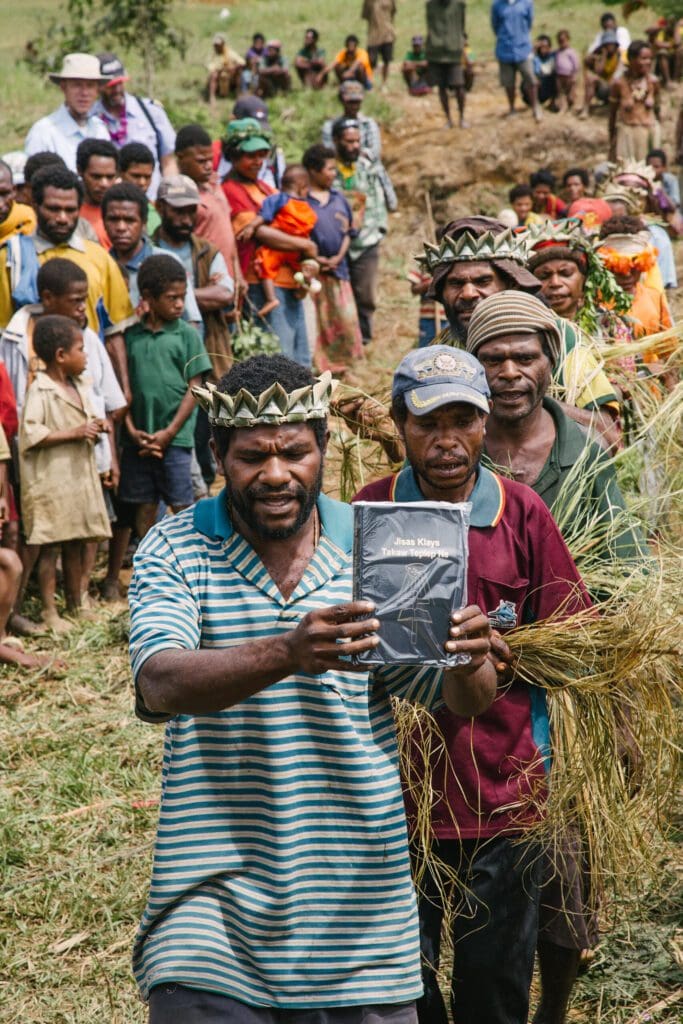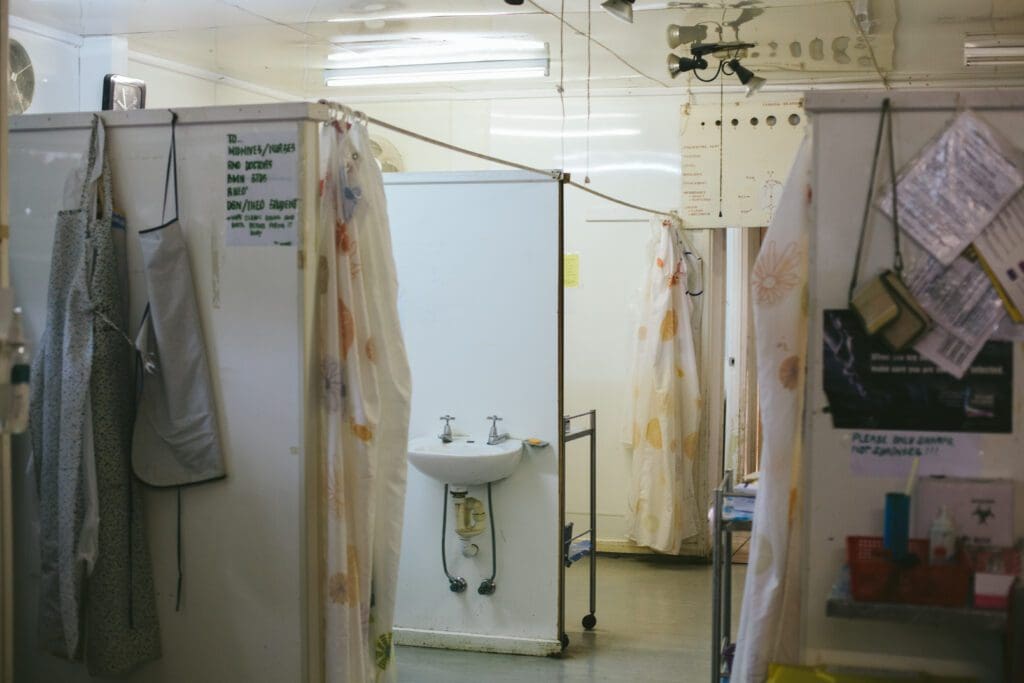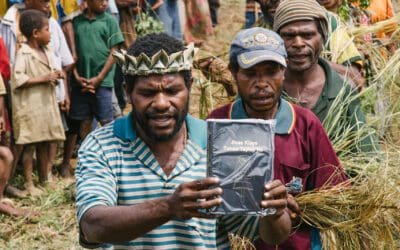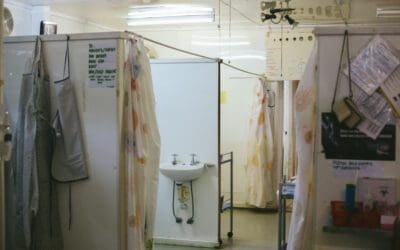Feature Story
She Threw Baby Jesus into a Well?
Laughter erupted all around me. I didn’t understand the language well enough yet to know why, but I could tell that they’d just heard something very amusing.
Our team had translated Luke 2, which tells about Jesus’ birth. Now they were reading it to fellow refugees who had never heard it before and seeking feedback on whether it sounded “right” and made sense. They had just read about Mary placing baby Jesus in the manger: “Na cägiyäng päxäcenä zäläg näs päxä apang na camulungi na tandä ndä cäzänggasa tä kabuga.”
We had struggled to find the best word for “manger”—food trough—and had settled on kabuga, though we weren’t sure. Kabuga has two meanings. Unfortunately the hearers initially assumed its other one, which left them wondering why Jesus’ mother threw him into a well! That’s what the laughter was all about.
When this happens we ask people to suggest alternate words. This leads to good conversations and, often, to excellent ideas that make the meaning clearer and more accurate. For this text, though, there was no better word. So for the benefit of future readers, we added a footnote that here kabuga is a “thing in which food is given to the cattle” rather than a well in which a newborn baby would surely drown.
It is so invigorating to watch people who are intently listening to God’s words to them for the first time.
Community comprehension testing engages people in discussing God’s Word.
The Christmas story would have included a very confusing statement if not for the comprehension testing that we do here in this refugee community. Finding mistakes and difficult-to-understand wording is just one reason this part of the translation process is so valuable. Engaging people in discussion about the meaning of God’s Word is another.
It’s valuable for me, too. I love being with the team when they do community comprehension testing. It’s a great language learning opportunity for me as well as a great way to get to know people in our language community. And, of course, there’s coffee. There’s always coffee.
More importantly, just like Jesus came to this world for the sick, the immoral, and the marginalized, our team likes to test Scripture with the unchurched around the refugee camp where we live. The “uninitiated,” if you will. The refugees whose homes we enter to read Scripture wouldn’t dream of setting foot inside a church building, which makes it even more important that we go to them. Offering to read them something written in their language is the perfect door opener.
It is so invigorating to watch people who are intently listening to God’s words to them for the first time.
In God’s mysterious timing, the Scripture portions we read with people tend to parallel events with which they are struggling. Traumatized by endless war and driven from their homes, the people in refugee camps like this one have already suffered unimaginable loss. Life is a constant struggle for survival, and they have reason to feel forsaken and unloved.
In this dry, hot season, the water distribution points in this refugee camp aren’t providing enough water for the 50,000+ people who depend on them. All day, women and children walk from water point to water point, looking for one that is operating and that still has water for their families.
Recently life became even harder for some of the refugees when their ration cards for food distribution were unexpectedly cancelled. Thousands of people stood all day in the scorching sun, for many days in a row, only to be told that they wouldn’t receive new cards. No cards meant no food.
While this was happening we were testing Luke 12. In God’s wisdom, the words He had us reading to the people as we visited them in their homes included Jesus’ assurance to His disciples, “Do not be anxious about your life, what you will eat … .”
What an opportunity for people to feel relief when they heard that their Father cares more for them than for the ravens, which He freely feeds. I pray these refugees will begin to trust in their heavenly Father’s hand rather than in a handout from an aid agency.
Life in a refugee camp is an extreme journey of highs and lows, but we can always count on the Word of God to be our steady rock. And community comprehension testing is a platform from which we offer a hand up onto our Rock.
Related Content
Blog

By Pioneer Bible Translators
Feature Story Feature Story The Tay people of Papua New Guinea celebrate receiving their New Testament. Dedicated in 2014, it is having a transforming impact in their churches and communities. Focus on Bible Translation Bible translat…
Read More long arrow alt right icon
Event
Feature Story Feature Story The Tay people of Papua New Guinea celebrate receiving their New Testament. Dedicated in 2014, it is having a transforming impact in their churches and communities. Focus on Bible Translation Bible translat…
More Information long arrow alt right icon
Page
Feature Story Feature Story The Tay people of Papua New Guinea celebrate receiving their New Testament. Dedicated in 2014, it is having a transforming impact in their churches and communities. Focus on Bible Translation Bible translat…
Explore This Pagelong arrow alt right icon
Pray
Weaving Words
You're the first person to pray!
This has been prayed times
Role
Feature Story Feature Story The Tay people of Papua New Guinea celebrate receiving their New Testament. Dedicated in 2014, it is having a transforming impact in their churches and communities. Focus on Bible Translation Bible translat…
Explore This Role long arrow alt right icon
Video

Feature Story Feature Story The Tay people of Papua New Guinea celebrate receiving their New Testament. Dedicated in 2014, it is having a transforming impact in their churches and communities. Focus on Bible Translation Bible translat…
See Video long arrow alt right icon
Feature Story

Read More long arrow alt right icon
Blog

By Greg Pruett, PhD
Feature Story Last year I visited a place where people don’t know the name of Jesus. I don’t mean that they don’t “know Jesus.” I’m saying they don’t know that He exists at all. It&rs…
Read More long arrow alt right icon
Event
Feature Story Last year I visited a place where people don’t know the name of Jesus. I don’t mean that they don’t “know Jesus.” I’m saying they don’t know that He exists at all. It&rs…
More Information long arrow alt right icon
Page
Feature Story Last year I visited a place where people don’t know the name of Jesus. I don’t mean that they don’t “know Jesus.” I’m saying they don’t know that He exists at all. It&rs…
Explore This Pagelong arrow alt right icon
Pray
What is a Jesus?
You're the first person to pray!
This has been prayed times
Role
Feature Story Last year I visited a place where people don’t know the name of Jesus. I don’t mean that they don’t “know Jesus.” I’m saying they don’t know that He exists at all. It&rs…
Explore This Role long arrow alt right icon
Video

Feature Story Last year I visited a place where people don’t know the name of Jesus. I don’t mean that they don’t “know Jesus.” I’m saying they don’t know that He exists at all. It&rs…
See Video long arrow alt right icon
Blog

By Erin Duplechin
**This post contains heavy subject matter regarding a stillbirth. We got the call at 6:30 a.m. on a Sunday morning. Our close friend Anna was in labor and needed to get to the hospital soon. My husband Kevin got up, dressed quickly, and hea…
Read More long arrow alt right icon
Event
**This post contains heavy subject matter regarding a stillbirth. We got the call at 6:30 a.m. on a Sunday morning. Our close friend Anna was in labor and needed to get to the hospital soon. My husband Kevin got up, dressed quickly, and hea…
More Information long arrow alt right icon
Page
**This post contains heavy subject matter regarding a stillbirth. We got the call at 6:30 a.m. on a Sunday morning. Our close friend Anna was in labor and needed to get to the hospital soon. My husband Kevin got up, dressed quickly, and hea…
Explore This Pagelong arrow alt right icon
Pray
Where Mercy Meets Us
You're the first person to pray!
This has been prayed times
Role
**This post contains heavy subject matter regarding a stillbirth. We got the call at 6:30 a.m. on a Sunday morning. Our close friend Anna was in labor and needed to get to the hospital soon. My husband Kevin got up, dressed quickly, and hea…
Explore This Role long arrow alt right icon
Video

**This post contains heavy subject matter regarding a stillbirth. We got the call at 6:30 a.m. on a Sunday morning. Our close friend Anna was in labor and needed to get to the hospital soon. My husband Kevin got up, dressed quickly, and hea…
See Video long arrow alt right icon
Feature Story

Read More long arrow alt right icon
Blog

By Eunice Herchenroeder
It was Christmas Eve. I wasn’t in much of a holiday mood, though. The selection of potential gifts for our children had s…
Read More long arrow alt right icon
It was Christmas Eve. I wasn’t in much of a holiday mood, though. The selection of potential gifts for our children had s…
More Information long arrow alt right icon
Donor Impact Story

Read More long arrow alt right icon
Page
It was Christmas Eve. I wasn’t in much of a holiday mood, though. The selection of potential gifts for our children had s…
Explore This Pagelong arrow alt right icon
Pray
Thursday Prayer Focus: Confessions of a Homesick Missionary
You're the first person to pray!
This has been prayed times
Role
It was Christmas Eve. I wasn’t in much of a holiday mood, though. The selection of potential gifts for our children had s…
Explore This Role long arrow alt right icon
Video

It was Christmas Eve. I wasn’t in much of a holiday mood, though. The selection of potential gifts for our children had s…
See Video long arrow alt right icon
Blog

By Dacie Lindner
A Bible in his own language had been Victor’s prayer for 39 years. Now this prayer was beginning to be answered.…
Read More long arrow alt right icon
A Bible in his own language had been Victor’s prayer for 39 years. Now this prayer was beginning to be answered.…
More Information long arrow alt right icon
Page
A Bible in his own language had been Victor’s prayer for 39 years. Now this prayer was beginning to be answered.…
Explore This Pagelong arrow alt right icon
Pray
“This…This is a Good Feeling!”
You're the first person to pray!
This has been prayed times
Role
A Bible in his own language had been Victor’s prayer for 39 years. Now this prayer was beginning to be answered.…
Explore This Role long arrow alt right icon
Video

A Bible in his own language had been Victor’s prayer for 39 years. Now this prayer was beginning to be answered.…
See Video long arrow alt right icon
Blog

By Iya
In my North American world, Starbucks is selling Pumpkin Spice Lattes and Peppermint Mocha Cappuccinos. Thanksgiving with its bountiful feast is quickly approaching. The Christmas decorations, for sale since August, have been discounted.…
Read More long arrow alt right icon
Event
In my North American world, Starbucks is selling Pumpkin Spice Lattes and Peppermint Mocha Cappuccinos. Thanksgiving with its bountiful feast is quickly approaching. The Christmas decorations, for sale since August, have been discounted.…
More Information long arrow alt right icon
Page
In my North American world, Starbucks is selling Pumpkin Spice Lattes and Peppermint Mocha Cappuccinos. Thanksgiving with its bountiful feast is quickly approaching. The Christmas decorations, for sale since August, have been discounted.…
Explore This Pagelong arrow alt right icon
Pray
Home for the Holidays
You're the first person to pray!
This has been prayed times
Role
In my North American world, Starbucks is selling Pumpkin Spice Lattes and Peppermint Mocha Cappuccinos. Thanksgiving with its bountiful feast is quickly approaching. The Christmas decorations, for sale since August, have been discounted.…
Explore This Role long arrow alt right icon
Video

In my North American world, Starbucks is selling Pumpkin Spice Lattes and Peppermint Mocha Cappuccinos. Thanksgiving with its bountiful feast is quickly approaching. The Christmas decorations, for sale since August, have been discounted.…
See Video long arrow alt right icon
Make an Impact by Praying Now
Pray
God, please break the bonds of trauma and powerfully reveal yourself as the Great Healer to refugees and immigrants among whom we are serving.
You're the first person to pray!
This has been prayed times
Pray
God, please move in powerful ways to bring the right individuals to fill urgently needed administrative roles in Nile Africa, Papua New Guinea, and West Africa.
You're the first person to pray!
This has been prayed times
Pray
God, please guide our teammates in Southeast Asia as they seek to know how to be involved in Bible translation and Scripture impact among the Deaf who live there.
You're the first person to pray!
This has been prayed times
Pray
Thank you, God, for showing our teammates in Eurasia many more people they can serve. Thank you for building their capacity to assess Bible translation and Scripture impact needs in this area.
You're the first person to pray!
This has been prayed times
Pray
God, please bring much fruit from our presence at the International Conference on Missions this weekend. Please bring our teammates into contact with men and women who desire to meet Bible translation, church planting, and Scripture impact needs.
You're the first person to pray!
This has been prayed times
Pray
God, please continue opening hearts among a people group in Nile Africa as we interact with them through ethnomusicology and ethnoarts. Please help influential local people to be receptive to Jesus and to encourage local-language music and literature in their community.
You're the first person to pray!
This has been prayed times
The Bible Doesn’t Exist in Every Language — Yet.
Right now, more than 1,600 language groups are still waiting for God’s Word. But working together, our generation can translate Scripture into every viable language on Earth.
You can help make this happen!
Become a Donor
Scripture will be translated, churches will be planted, and lives will be transformed.
Pray With Us
Your prayers make an impact in reaching Bibleless people with God's Word.
Become a Teammate
Don't miss what God is doing! Help bring the Bible to the last unreached people groups.



